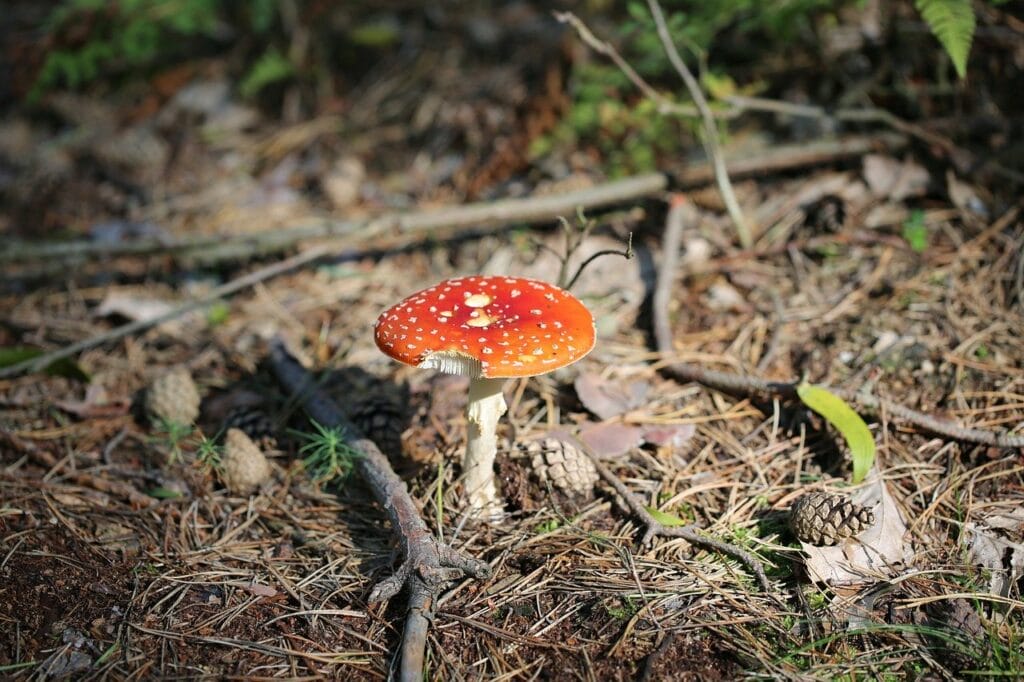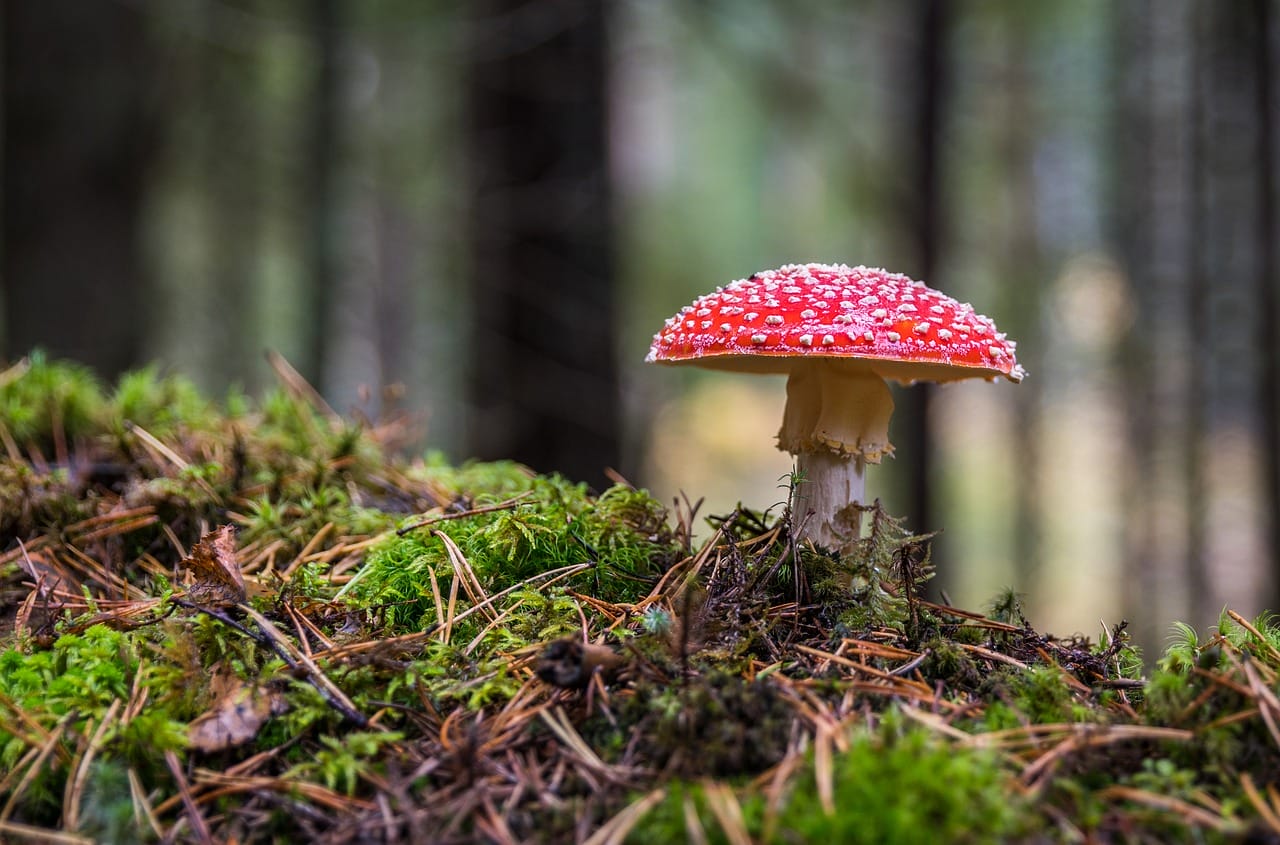Human beings have, over many millennia, observed and purposefully exploited the psychedelic properties of certain plants and fungi.
Notably, fungi – specifically magic mushrooms – are acknowledged as the primary natural reservoir of psychedelic substances.
The psychedelic compound psilocybin, derived from these mushrooms, has held a crucial role throughout history, being utilized in both religious rituals and therapeutic practices.
A number of researchers are dedicating their resources towards studying the potential health benefits of shrooms online. Current studies have shed light on the impact of psilocybin mushrooms, sparking hope for many and prompting a conversation about their integration into Canada’s healthcare framework.
Essential Points:
- Magic mushrooms, which contain the psychoactive substance psilocybin, can be beneficial in addressing mental health challenges in Canada.
- Compared to opioids, psilocybin poses a lower risk in terms of addiction and toxicity and is thus considered safer.
- Psilocybin demonstrates enduring efficacy in treating depression, with effects that may persist for up to a year.

Deciphering Psilocybin
Psilocybin is a tryptamine, an indole-alkylamine, found in magic mushrooms and bears structural resemblance to lysergic acid diethylamide (LSD). Its effects include hallucinogenic and euphoric experiences, likely resulting from its interaction with the serotonin (5-HT) receptors in the central nervous system.
Given its interplay with serotonin receptors, high-quality magic mushrooms show a unique potential to aid in the treatment of mental health disorders.
Addressing Canada’s Mental Health and Opioid Crisis
Common Mental Health Disorders in Canada & Resistance to Treatment
| 2012 | 2022 | |
| Major Depressive Episodes | 4.7% | 7.6% |
| Generalized anxiety disorder | 2.6% | 5.2% |
| Social phobia | 3.0% | 7.1% |
| Alcohol use disorder | 3.2% | 2.2% |
Over one-third (36.6%) of individuals dealing with mood, anxiety, or substance use disorders reported that their healthcare and mental health needs were either unmet or not fully met.
An article from the Canadian Journal of Psychiatry shed light on the treatment-seeking behaviors of patients with depression. The study analyzed 1282 patient records from 135 doctors. It identified 263 patients as having treatment-resistant depression (TRD), which suggests a prevalence rate of 21.7% across Canada.
The Opioid Crisis
About 8 million Canadians, or one in every five, endure chronic pain. Unmanaged pain can negatively influence various facets of a person’s life.
Healthcare practitioners occasionally recommend opioid medications for managing pain. While opioids can provide benefits like pain relief and improved functionality, they also carry potential risks.
Between January 2016 and March 2022, a minimum of 30,843 deaths related to opioid toxicity were recorded in Canada. A majority of these tragic events happened early in 2021, with a staggering 5,368 cases reported. It’s worth highlighting that over 88% of these incidents took place in the provinces of British Columbia, Ontario, and Alberta.
Regarding Major Depressive Episodes
A study published in the Journal of Psychopharmacology recruited 27 individuals who had a long history of depression. Most of these people had been suffering from depressive symptoms for approximately two years before joining the study. 88% of them had previously been treated with conventional antidepressants, and 58% reported the ongoing use of these medications during their depressive episodes.
The investigators noted significant reductions in depression following psilocybin treatment for both groups. Additionally, they found that the severity of depression consistently stayed low at the follow-up points one, three, six, and 12 months post-treatment.
Regarding General Anxiety and Social Phobia
A case study published in the Croatian Medical Journal in October 2021 examined HTML:
The narrative revolves around a
A 16-year-old introverted boy sought help from a mental health clinic due to his increasing anxiety, declining academic performance, and tendency to isolate himself. His challenges were amplified by a learning disability and a lack of motivation to do schoolwork, which made group therapy overwhelming and ineffective.
Substantial improvements were observed after three psilocybin sessions over 18 months. His anxiety subsided, and his communication with peers and teachers improved. He started to express his emotions more freely, actively participated in group therapy, and enjoyed better interpersonal relationships.
For Alcohol Use Disorder
A recent clinical trial, detailed in a study published in JAMA Psychiatry on August 24, revealed the potential of combining psilocybin and psychotherapy for the treatment of alcohol use disorder. The study observed the progress of 93 patients with this condition over 32 weeks.
Of those who underwent psilocybin-assisted therapy (48 individuals in total), there was a significant 83% decrease in alcohol consumption within eight months of their first dose. This is in contrast to the 51% reduction observed in the placebo group. Remarkably, nearly half of the participants who received psilocybin ceased drinking entirely.
Opioid Crisis
Elena Argento, a postdoctoral fellow at the University of British Columbia and BC Centre on Substance Use, is conducting research on the medicinal applications of psychedelics.
Argento explains that psilocybin can reduce addiction risks in two ways: it affects both neurobiology and psychology. She highlights the transformative experiences psychedelics can provide, characterized by a profound sense of awe and self-transcendence. These experiences often enable individuals to discover new perspectives and purposes in life, potentially prompting behavioral changes, especially in relation to addiction.
In a recent longitudinal study led by Argento and the BC Centre on Substance Use, they found a significant decrease in the likelihood of continued daily illicit opioid use among those who had used psychedelics recently or within the past six months.
Argento’s 2018 study also suggested that psychedelic use can serve as a protective factor against the correlation between prescription opioid use and suicide risk.
A different study identified connections between psilocybin use and a reduced risk of opioid use disorder. This earlier research indicated a 40% decreased risk of opioid misuse and a 27% reduced risk associated with opioid dependence over the
The previous year has seen an increase in psychedelic use.
The Need for Health Canada and Other Regulatory Bodies to Consider Psilocybin as Part of Canada’s Therapeutic Approach
Although Psilocybin is recognized for its potential positive effects on Canadians’ mental health, obtaining it remains challenging. Health Canada allows healthcare professionals to prescribe this treatment via the Special Access Program, still, the program’s stringent criteria serve as a significant barrier for many professionals and patients.
The therapeutic use of psilocybin-infused mushrooms could revolutionize mental health care in Canada, as it promises transformative benefits. Instead of depending solely on traditional, and sometimes less effective treatments like pharmaceuticals or opioid replacement therapy, psilocybin therapy provides an alternative with potentially lasting and profound effects.
Studies suggest that psilocybin therapy could offer long-term benefits, possibly saving patients substantial expenses on ineffective treatments. Moreover, research indicates that psilocybin is relatively safe, with low toxicity, minimal risk of misuse, and infrequent overdose incidents.
Where Can Psilocybin be Procured Online?
Canadians struggling to access psilocybin therapy can opt to buy magic mushrooms online as a relief to their present situations. They can browse through a range of magic mushroom products, from high-dose shrooms to microdose magic mushrooms.
High-dose shrooms are psychedelic mushrooms available in various forms, including dried magic mushrooms, edibles, or beverages, which are consumed for their hallucinogenic and therapeutic effects.
Microdosing magic mushrooms involve products containing minor amounts of magic mushrooms. These products come in capsules, shroom edibles, or shroom tea. Purchasing shrooms online offers an alternate way to subtly benefit from these mushrooms. Shroom Delivery Toronto Canada exclusively sells premium magic mushrooms online, ensuring the best quality.
Is Psilocybin a Good Fit for Canadian Healthcare?
Psilocybin is a substance often misunderstood because of its use recreationally. It’s vital to realize that psilocybin has a safer profile compared to opioids and other drugs commonly prescribed in healthcare settings.
There is a growing body of evidence showcasing its potential benefits, similar to those of marijuana, in treating various mental health conditions. dimensions of reality.
From a health and wellness perspective, magic mushrooms have been leveraged in mental health therapies and personal development.
What are the potential dangers and side effects associated with magic mushrooms?
Magic mushrooms can trigger a range of effects, both positive and negative. These might encompass hallucinations, altered perceptions, and psychological alterations. On the negative side, they may instigate nausea, dizziness, and in uncommon instances, psychological distress. It’s crucial to treat the use of magic mushrooms with care and respect, comprehending the potential hazards involved. It’s always prudent to consult with a health care expert before beginning any new regimen involving magic mushrooms.
Is it secure to purchase magic mushrooms online?
Purchasing magic mushrooms online can be safe, as long as you select a reliable source. It’s paramount to perform comprehensive research on the product, brand, and online dispensary before committing to a purchase. Customer reviews and ratings can be informative indicators of product quality and service dependability. Always opt for dispensaries that emphasize customer safety and satisfaction and provide secure payment methods.
Is it possible to cultivate my own magic mushrooms?
Yes, growing magic mushrooms at home is feasible and can be a rewarding endeavor. However, it necessitates specific conditions and an in-depth understanding of the cultivation process. Numerous kits and guides are available online to facilitate your cultivation journey. However, keep in mind that the legality of growing magic mushrooms varies by location, so it’s essential to comply with your local laws and regulations.
In the wellness community, some individuals opt for a more moderated approach, consuming small quantities of mushrooms to harness their benefits without inducing hallucinations.Suggested Articles:





